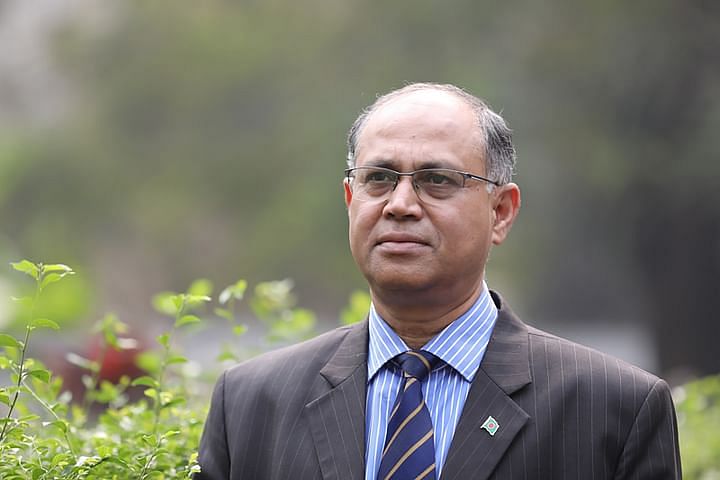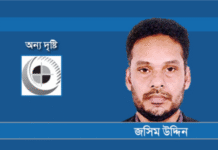
You are the president of Dhaka University Teachers’ Association. The election of DUTA has taken place without any contest. Is this a reflection of national politics and polls on the DUTA election too?
Those who did not take part in this year’s DUTA election have not considered the election unacceptable. Many were against the election due to the outbreak of coronavirus. But none boycotted the election. The nomination of blue panel has been fixed through the internal election. As a result, we have to pass through some sort of election. You will notice that the blue panel has won the DUTA elections for the last seven years. In that perspective, our victory is nothing abnormal. Now we are trying to come out from traditional trend. We are trying to ensure the interest of teachers and bring a momentum to the educational activities.
Dhaka University is set to complete a hundred years. You are the dean of law faculty. The law department will also complete a hundred years. How do you view the contribution of this institution of one hundred years?
The best educational infrastructure of this region was established in 1921 during the colonial period. This university has contributed a lot to the advancement of education and culture of the people. Throughout this long period, this university has imparted education, and has played role in creating human resources and development. In the beginning, the ratio of male and female students was 2:1, whereas the ratio of male and female students is now equal. The role of Dhaka University in the advancement of women is very big. This university has played role in the emancipation of political and economic freedom, human rights, language movement and the Liberation War of Bangladesh. It is linked to the emergence of Bangladesh, development and advancement.
At the juncture of this long one hundred years, self-assessment and criticism is important. Is the university now able to play the roles that you talked about?
In the course of time, Dhaka University has reached such a stage, it has to be admitted that the situation is no more like before. Dhaka University cannot provide the facilities that it would at the outset. Once Dhaka University was under huge pressure due to the limited scope of higher education. This had an impact on the quality of education of the university. There is a gap between the expectations and the gains. Now many universities at the public and private level are being established and it is lessening pressure on Dhaka University. But our main challenge ahead is to ensure quality education.
The number of students is a big obstacle to ensure quality of education in Dhaka University. It is urgent to reduce the number of students to ensure quality of education. The departments have to be restructured. There are a number of institutes at Dhaka University that need to be restored to the previous roles. Now there is no difference between the institutes and departments. The institutes are supposed to provide masters and MPhil. Whereas some departments need to be merged, but instead were divided and new departments have been created. New departments have been created without considering the realities. There are problems in the exam system too. Both semester and annual systems are effective in Dhaka University. These are creating big problems. In proportion of students, there is scarcity of education materials, environment and infrastructure. You all know how the students stay in the dormitories due to crisis of seats.
Who will solve these problems? How can this be done?
I think Dhaka University needs a responsible visionary administration. We have to fix our vision and mission. It is more important to first fix the role Dhaka University will play nationally, rather than clinching a place in world ranking. The issue of facilities of students should get the highest priority in the development of infrastructure. It is very urgent to ensure a higher allocation for education and research. Academic calendars are made but not followed. The act of the university should be strictly followed, but is not done in all sectors. We play a biased role in many areas and accept the serious irregularities. This hampers advancement of the university.
You have talked about the problems in the administrative structure of the university. Is political influence a cause of it?
Political influence is an old problem. Political power has always tried to control Dhaka University. This has harmed Dhaka University to a great extent. The attempt to take political control is responsible for this situation of Dhaka University. Teachers may have political ideology. This would not be a problem, if professional mindset and teaching got priority. But unfortunately that is not happening.
Allocation for research is normally little in Dhaka University. According a report published in newspaper, it is seen that even a little amount of money from the allocation for research could not be spent. Why is there so much apathy to research in an institution like Dhaka University?
Money is not allocated for research. We face a crisis for research. The allegation you made is hardly acceptable. There are two funds in the university. One is self-income and another is government allocation. Now these two have been unified. The government made allocation taking our own fund into account. That allocation is not sufficient. That money is spent for regular education activities. Nothing remains for research. We are hearing from the national level that money is no problem. But there is a deficit when allocating for education or research. The matter does not get priority at the state and administrative level. It is noted that teachers have no role in the planning related to education. Those who deal with these matters, view it in the perspective of administration. The University Grants Commission is busy to rule the universities instead of enhancing quality of education. The university administration has shortcomings too. Except some exceptions, none can play due roles. They have overburdened the university in the name of expansion. Funds are spent in areas other than for which these have been allocated. Excess staff has been recruited. Many are just doing as they please. Nepotism has taken place in the name of development. As a result, the progress of the university has been hampered.
In the past Dhaka University Teachers’ Association (DUTA) played active roles for realising all types of rights including human rights and democracy. Now the teachers’ association take stance on political consideration. It can be said many steps are taken to please the government and many things are avoided.
The party politics has a very bad impact. The teachers’ association has to take a stance on the basis of opinions of all. Those who dissent are targeted. They have to face invisible obstacles. As a result many are afraid to talk. This situation has not been created overnight. Given reality, the cannot play the role or take the stance that it should.
What is the way to get rid of the problems in the higher educational institutions including Dhaka University?
I think it is necessary to constitute a higher education commission in Bangladesh. The University Grants Commission cannot play its role. The commission has to be formed involving educationists and people related to education instead of bureaucrats. The number of universities at the public and private level is increasing. These institutions are facing acute crisis of teachers. The guideline for the recruitment of teachers of all public universities has been unified. But I think there must be some additional facilities and concessions in the recruitment of teachers outside Dhaka and remote areas. It has to be ensured that good teachers and retired teachers of different universities can work there for sometime.
There must be unity and coordination in the guidelines of universities between the public universities and private universities. Higher educational institutions in a country cannot operate in different systems.
Thank you
Thank you too
*This interview, originally published in Prothom Alo print edition, has been rewritten in English by Rabiul Islam.









